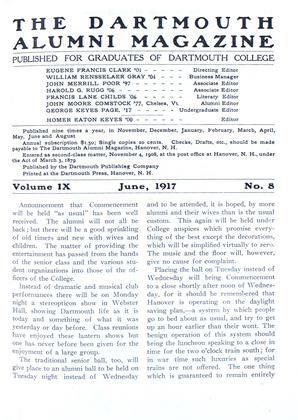has been well received. The alumni will not all be back; but there will be a good sprinkling of old timers and new with wives and children. The matter of providing the entertainment has passed from the hands of the senior class and the various student organizations into those of the officers of the College.
Instead of dramatic and musical club performances there will be on Monday night a stereopticon show in Webster Hall, showing Dartmouth life as it is today and something of what it was yesterday or day before. Class reunions have enjoyed these lantern shows but one has never before been given for the enjoyment of a large group.
The traditional senior ball, too, will give place to an alumni ball to be held on Tuesday night instead of Wednesday and to be attended, it is hoped, by more alumni and their wives than is the usual custom. This again will be held under College auspices which promise everything of the best except the decorations, which will be simplified virtually to zero. The music and the floor will, however, give no cause for complaint.
Placing the ball on Tuesday instead of Wednesday will bring Commencement to a close shortly after noon of Wednesday, for it should be remembered that Hanover is operating on the daylight saving plan,— a system by which people go to bed about as usual, and try to get up an hour earlier than their wont. The benign operation of this system should bring the luncheon speaking to a close in time for the two o'clock train south; for in war time such luxuries as special trains are not offered. The one thing which is guaranteed to remain entirely unaltered is the hardship of dormitory life. There will be the usual shortage of chairs, towels, mirrors and other articles of convenience and necessity. It is probable, however, that these lacks will be accepted with more than customary fortitude as constituting, after all, one of the minor horrors that must be bravely endured because of the exigencies of the times.
To one who was in College in the winter and spring of 1898 when the Spanish war broke, the contrast of then with now is growingly impressive. Dates are not very important in a record of impressions. It was somewhere in the blizzardy fag end of winter that news came of the sinking of the Maine. It was on a Wednesday night, for the fraternities were in session, and with the exciting word there was an immediate rush for broomsticks. Somewhere in Sanborn Hall there was an impromptu mock rally. Then the seriousness of the situation began to be realized. The declaration of war and the old time call for one hundred thousand volunteers found Dartmouth students busily drilling on the campus. Then came enlistment and a Dartmouth company enrolled in the New Hampshire guard and went to Chickamauga Park and typhoid fever.
But their going was a thrilling thing. They all marched into chapel for vespers on the Sunday just preceding (for everyone went to Chapel then) and President Tucker spoke to and of them. Probably no one of them remembers now what he said. But every man who sat in that crowded Chapel, hushed and tense, remembers the solemnity of the service,the throb that went with the President's words, the lump in his own throat the brimming of his eyes that he tried to ignore; the almost groping slowness and silence of the crowd as it dispersed after the exercise.
Presently, on a great day, the whole College escorted its volunteers to the station and saw them off to the war. The band played, noisily at least, the crowd cheered, and frenzied Dartmouth yells for the Dartmouth men who were upholding the old traditions rent the air. Then the train across the valley screamed and whisked the volunteers away, a solid phalanx buoyed by common hopes and expectations and the public plaudits of their fellows. After their going, things proceeded much as before, save for some sporadic voluntary drill on the campus.
the Star Spangled Banner; every hand is raised in salute. The flag halyard is released and the bright banner slips slowly down the pole to be furled for the night. Then after a little the campus is deserted.
Cap and gown have disappeared from Sunday vespers, and khaki has taken its place. The busy groups of seniors industriously carving canes are not much in evidence. Apparently they have small heart for the custom. The songs that with the first unfolding of spring blossoms customarily waken the evening echoes from Bartlett Tower to Mink-Brook have not been heard this year. Whether the rest of the country understands the fact or not, the colleges of America realize that the nation is at war.
 View Full Issue
View Full Issue
More From This Issue
-
 Article
ArticleTHE COLLEGE IN EARLY WAR-TIME
June 1917 By Edwin J. Bartlett. -
 Article
ArticleUNDERGRADUATES IN WAR SERVICE
June 1917 -
 Class Notes
Class NotesCLASS OF 1910
June 1917 By Sturgis Pishon -
 Books
BooksALUMNI PUBLICATIONS
June 1917 -
 Article
ArticleWITH THE NAVAL RESERVE
June 1917 By Edwin Parker Hayden '16 -
 Article
ArticleTHE TRAINING SCHOOL FOR MILITARY STORES SERVICE
June 1917
Article
-
 Article
ArticleFreshmen Set Records
April 1933 -
 Article
ArticleFINANCIAL REPORT FOR THE CLASS OF 1934
October 1934 -
 Article
ArticleMasthead
JANUARY 1966 -
 Article
ArticleMasthead
JUNE 1966 -
 Article
ArticleTHE GROWTH AND THE USE OF THE LIBRARY
March, 1926 By Professor Charles N. Haskins -
 Article
ArticleTall Man High Average
June 1993 By Robert H. Nutt '49



